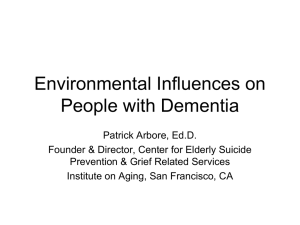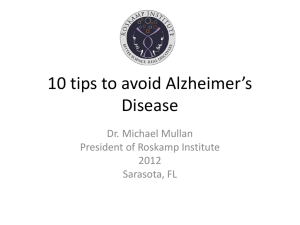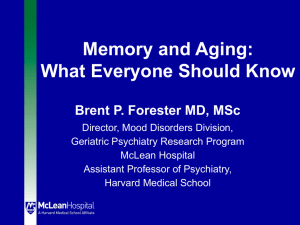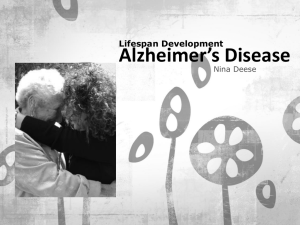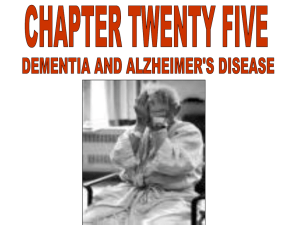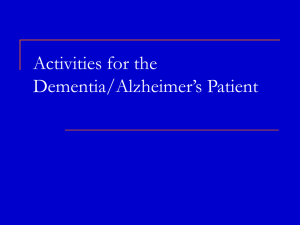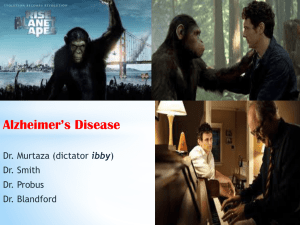The Alzheimer`s Prevention Program
advertisement
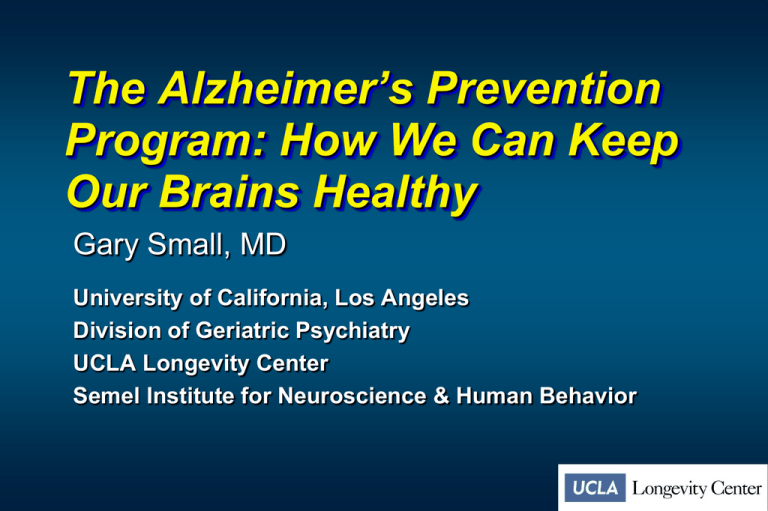
The Alzheimer’s Prevention Program: How We Can Keep Our Brains Healthy Gary Small, MD University of California, Los Angeles Division of Geriatric Psychiatry UCLA Longevity Center Semel Institute for Neuroscience & Human Behavior Alzheimer’s Disease is in the News and on our Minds Scientists Pursue an Unusual Tactic Against Alzheimer’s Lifestyle Changes Can Reduce Risk of Alzheimer's Increased Life Expectancy and Epidemic of Alzheimer’s Life expectancy at birth in U.S. In 1900: 47 years Today: 78 years (men – 76; women – 80) Age is the single greatest risk factor for Alzheimer’s 80 million Baby Boomers (born 1946 – 1964) Every 70 seconds another American is diagnosed with Alzheimer’s disease What is Alzheimer’s Disease? 1906: Alois Alzheimer presented case: confused, psychotic 51 year-old woman who progressed rapidly until her death 4 years later Her autopsied brain tissue showed waxy protein fragments/twisted fibers that define the disease 1968: scientists discovered same plaques/tangles caused “senility” Plaques Tangles Amyloid Plaques and Tau Tangles in Alzheimer’s Disease and Normal Aging Plaques Alzheimer’s Tangles Courtesy of Harry Vinters, MD. Normal PET Scanner Plaques and Tangles Accumulate in the Brain as Memory Worsens More Protein Less Protein Memory Score FDDNP-PET scans of 20 volunteers (8 normal, 6 MCI, 6 Alzheimer’s) Some Definitions Memory Learning Recall Cognition Memory Attention Visual/spatial skills Reasoning Dementia Memory loss + another impairment Interferes with everyday life Alzheimer’s disease Most common dementia cause Gradual onset/progression Plaques & tangles Example of Healthy Brain Aging Madame Jeanne Louise Calment 1875-1997 Cognition and Aging Normal Aging Mild Cognitive Impairment Cognition Alzheimer’s Dementia Age The Most Common Memory Complaints Names and faces Where we put things Forgetting an appointment or plan Forgetting a word or name we should know that is on “the tip of your tongue” Grandma Ollie at 104 and me Predicted Result of Early Treatment Cognitive Function Early Treatment No Treatment Late treatment at time of diagnosis using current clinical methods Time Brain protection more feasible short-term strategy than brain repair Medications for Alzheimer’s Disease Mild Aricept (donepezil) Exelon (rivastigmine) Namenda (memantine) Impairment Disease modifying Placebo Symptomatic Disease modifying Severe Start Treatment End Treatment Time Ferris. Alzheimer Dis Assoc Disord. 2002;16(suppl 1):S13-S17. Possible Anti-Plaque/Anti-Tangle Treatments Secretase inhibitors Vaccines Monoclonal antibodies Anti-inflammatory drugs Statins Intranasal insulin spray Lithium Small. Br Med J. 2002;324:1502-1505; Peila et al. Stroke. 2001;32:2882-2889; Craft, et al. Arch Neurol. 2011 Sept 12 [Epub ahead of print]. Anti-Inflammatory Treatment Increased Cognition and Brain Function in Normal Aging Mean age: 59 years 18-month placebo controlled trial Cognition improved Executive function (p=.03) Semantic memory (p=.02) Brain function (PET scanning) 6% increase in prefrontal cortex (p=.003) Small GW, et al. Am J Geriatr Psychiatry 2008;16:999-1009. Supported by NIMH. MacArthur Study of Successful Aging Genetics (what we inherit from our parents) contributes only 1/3 of success Brain Healthy Lifestyle Strategies Associated with a Lower Risk for Dementia Physical conditioning Mental challenge/cognitive training Stress reduction Healthy diet Small GW. What we need to know about age related memory loss. Br Med J 2002;324:1205-5. Physical Exercise Active laboratory animals larger brains better memory Human studies Cardiovascular conditioning larger brain size (parietal, temporal, frontal areas) Physically active adults lower Alzheimer’s risk Brisk walking improves cognition (vs. stretching/toning) Gage. J Neurosci. 2002;22:612-613; Freidland et al. Proc Natl Acad Sci U S A. 2001;98:3440-3445; Colcombe et al. J Gerontol 2003;58:176-180; Larson EB, et al. Ann Int Med. 2006;144:73-81. Mental Exercise Builds Brain Muscle Mental stimulation activates neural circuits associated with lower Alzheimer’s risk Educational achievement, bilingualism, doing puzzles Lower dementia risk Memory training can improve memory ability quickly and can maintain higher performance for 5 or more years Ball et al. JAMA 2002;288:2271-81; Willis et al. JAMA. 2006;296:2805-14; Craik FI, et al. Neurology. 2010;75:1726-9. Your Brain on Google UCLA Study of the Effects of Internet Searching on Neural Circuitry Small, Moody, Siddarth, Bookheimer. Am. J. Geriatr. Psychiatry. 2009;17:116-26. Funded by the Parvin Foundation Study Methods Recruit middle-aged and older people with minimal Internet experience Functional MRI Stimulation Tasks During fMRI Reading a text page Searching the Internet Your Brain on Google Net Naive Net Savvy Text Internet Your Brain on Google Net Savyy Group Neural Network Responses to Mental Challenge Brain Activation Task strategy engagement Cognitive efficiency with task repetition Unfamiliar task Time Calisthenics for the Older Mind UCLA Longevity Center Memory Training • • • • Four-week course taught by volunteer trainers with monthly follow-up booster sessions Mean student age, 70 years; range, 14-93 ~20,000 participants have completed the course Currently available in California, Arizona, Florida, Illinois, Iowa, Maryland, and Pennsylvania LOOK, SNAP, CONNECT Look Actively observe what you want to learn Snap Create a vivid mental snapshot or memorable image Connect Visualize a link to associate images Do you remember this face? Do you remember her name? Names and Faces Chelsea Notice her cheeks and see a Cheshire cat smile Names and Faces Sue Bangel She’s an attorney with bangs Memory Word List Beach Professor Horse Teddy bear Cigar Nun Palm tree Pasta Stress and Risk for Alzheimer’s Disease Animal studies: Chronic stress smaller brains impaired memory Human studies: Chronic stress can cause depression and increase dementia risk People prone to stress two-fold greater Alzheimer’s risk Cortisol injections temporarily impair memory Sapolsky. Exp Gerontol. 1999;34:721-732; Newcomer et al. Arch Gen Psychiatry. 1999;56:527-533; Köhler et al. Am J Geriatr Psychiatry. 2011;19:902-5; Wilson et al. Neurology. 2003;61:1479-85. Stress Reduction and Brain Health Effect of meditation vs. relaxation on brain activity: Meditation > Relaxation Right frontal cortex Right inferior temporal gyrus Left Thalamus 3.0 > Z > 1.6 Managing stress Int J Geriatr Psychiatry 2012 Mar 11. Relaxation > Meditation Nutrition and Dementia Risk Midlife obesity Increases late-life dementia risk Omega-3 fats From fish, nuts, supplements Lower risk for AD Anti-oxidant fruits & vegetables Lowers AD risk Adherence to Mediterranean diet Fruits, vegetables, legumes, cereals, and fish with minimal meat and dairy products Lowers AD risk Xu WL, et al. Neurology. 2011;76:1568-74; Devore EE, et al. Ann Neurol. 2012. 2012 Apr 26. doi: 10.1002/ana.23594 Van Praag. Nat Rev Neurosci. 2001;1:191-8; Gu Y, et al. J Alzheimers Dis. 2010 ; 22(2): 483–492. doi:10.3233/JAD2010-100897.; Xu WL et al, Neurology. 2011;76:1568-74; Gunstad et al. Surg Obesity Related Diseases. 2011;7:465-72. Obesity Worsens Memory While Weight Loss Improves Memory Obese people have a 4-fold increased risk for dementia Obese patients who had weight-loss surgery → After 12 weeks, they showed significant improvements in memory compared with controls Xu WL et al, Neurology. 2011;76:1568-74; Gunstad et al. Surg Obesity Related Diseases. 2011;7:465-72. Brain Protective Drinks Red wine (resveratrol) Anti-oxidant, “anti-aging” Any alcohol in moderation Caffeine Associated with lower risk for Alzheimer’s & Parkinson’s disease Ekselinen, Kivipelto. J Alzheimers Dis. 2010;20(Suppl 1):S167-7; Neafsey, Collins. Neuropsychiatr Dis Treat. 2011;7:465-84. New Research on Nutrition Double-blind placebo controlled trials in people with normal aging and mild cognitive impairment Curcumin: anti-oxidant, anti-inflammatory and antiamyloid properties 18-month study Outcome measures: neuropsychological testing and FDDNP-PET scans of plaques and tangles Pomegranate extract Anti-oxidant polyphenols 12-month study Outcome measures: neuropsychological testing Other Lifestyle Strategies Associated with Lowering Risk for Alzheimer’s Disease Avoid head trauma If you smoke, stop Keep a positive outlook Treat hypertension and high cholesterol Small G, Vorgan G. The Alzheimer’s Prevention Program. Workman, New York, 2012. Can We Prevent Alzheimer’s Disease? To definitively prove effectiveness of prevention strategies: Double-blind studies on 1000’s of people followed for decades But compelling epidemiological and short-term clinical trials: Already indicate what we can do now to possibly delay symptom onset Physical exercise and healthy diet can prevent or delay the onset of diabetes. Since having diabetes increases probability of developing Alzheimer’s, then these strategies should indirectly prevent Alzheimer’s as well Saaristo T, et al. Diabetes Care. 2010;33:2146-51; Ohara T, et al. Neurology. 2011;77:1126-34. Case Example: Jack W. 62-year-old executive Minimal physical exercise computer during day TV at night Diet snacks on chips rarely eats fruits, vegetables, or fish After learning about potential brain health benefits of exercise starts walking 30 minutes/day Physical Exercise: Estimated 2-Year Delay in Onset of Jack’s Symptoms Memory Ability Daily Brisk Walks Sedentary Lifestyle 68 69 Age (years) 70 71 72 73 Dementia-free gain 74 Jack’s Walking Program Motivates Him Becomes more socially engaged Starts losing weight from walking Improves diet Quits chips Adds daily fruits and vegetables Fish twice a week Practices mental aerobics Crosswords (even Friday puzzles—in pen!) Estimated 4-Year Delay in Symptom Onset From Alzheimer’s Prevention Strategies Memory Ability Alzheimer’s Prevention Program Sedentary Lifestyle 68 69 70 Age (years) 71 72 73 74 Dementia-free gain 75 76 The Projected Effect of Risk Factor Reduction on Alzheimer’s Disease Prevalence Estimated number of Alzheimer’s patients 34 million worldwide 5 million in U.S. Modifiable risk factors: Low education, smoking, physical inactivity, depression, hypertension, diabetes, obesity Projected effect of 25% risk factor reduction (# of fewer cases): Worldwide: 17 million U.S.: 3 million Barnes DE, Yaffe K. Lancet Neurol. 2011;10:819-28. How Can We Help People to Change Educate connection between lifestyle and disease prevention Fun and easy program See quick results motivates to continue healthy behaviors so they become habits Names and Faces Chelsea What’s her name? Names and Faces Sue Bangel Do you remember the lawyer? Memory Word List ANY VOLUNTEERS? Memory Word List Beach Professor Horse Teddy bear Cigar Nun Palm tree Pasta Conclusions Drug and biomarker development is key to future Alzheimer’s prevention treatments As we wait for results from long-term studies, the scientific evidence points to brain healthy behaviors to: improve quality of life today possibly stave off Alzheimer’s symptoms in the future FOR MORE INFORMATION www.DrGarySmall.com

